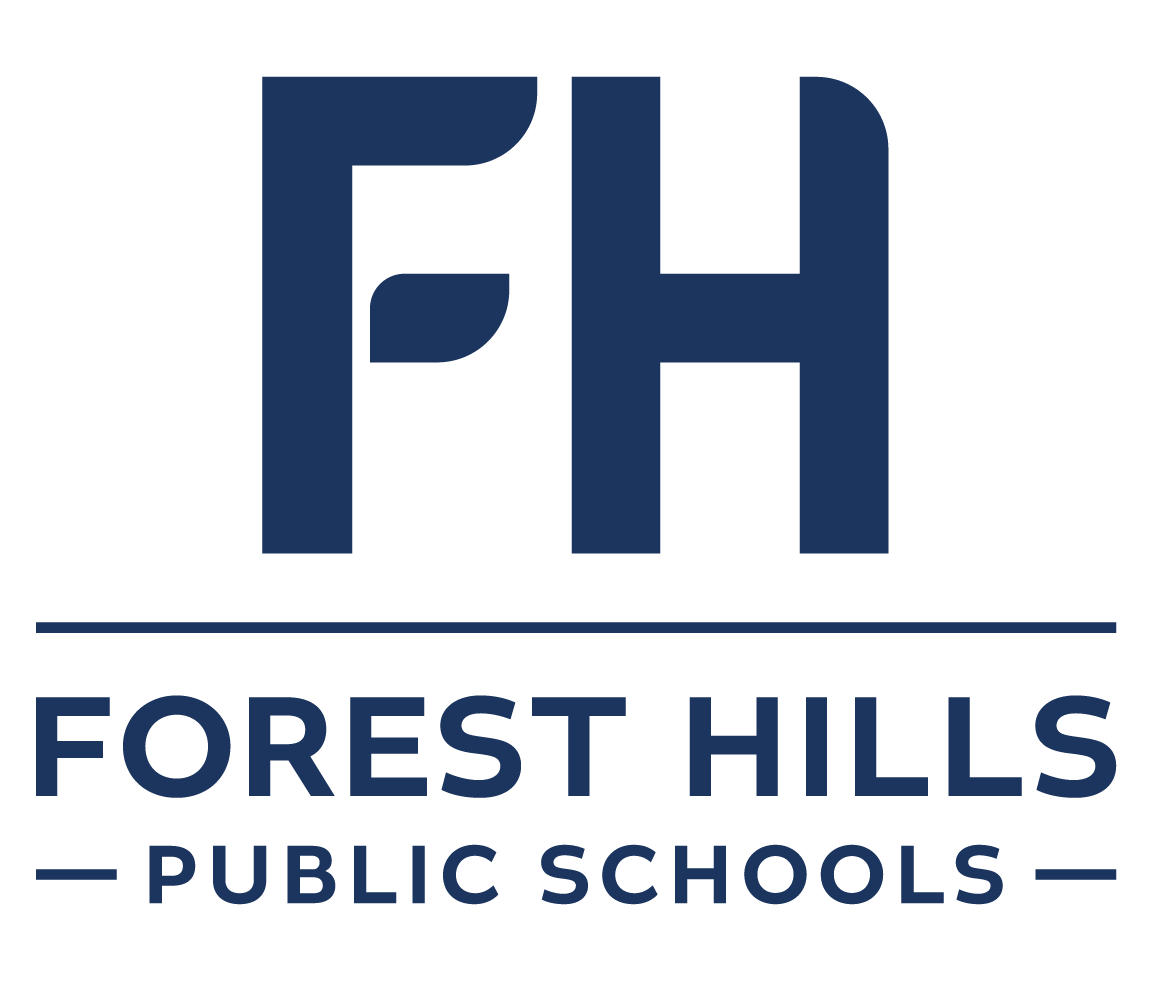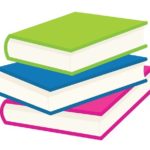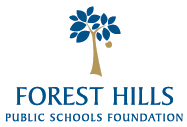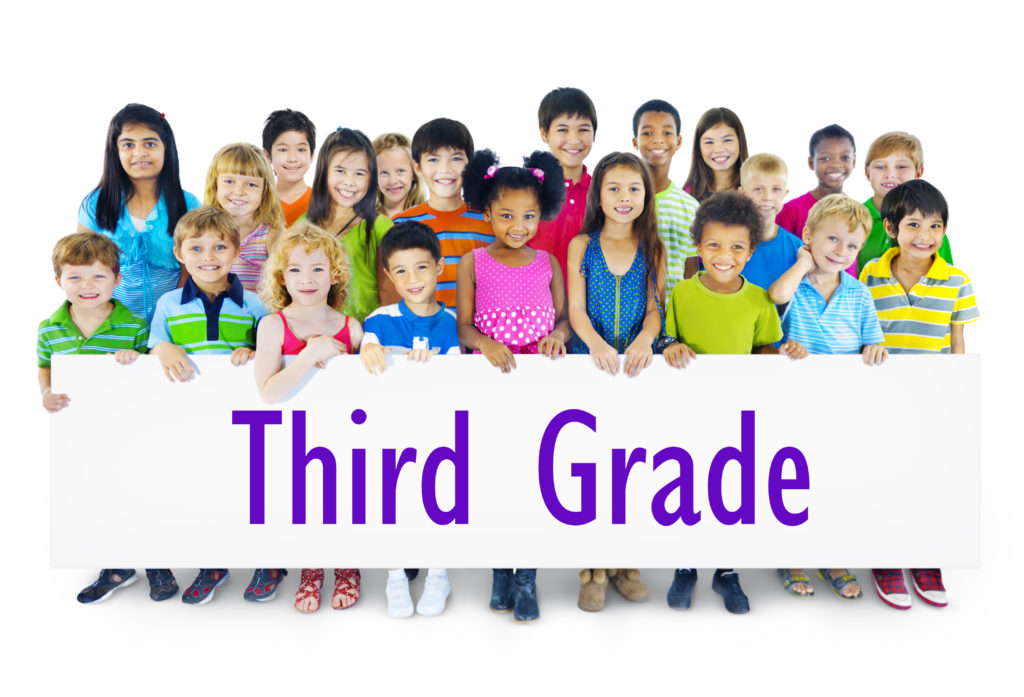
English Language Arts
Third graders build off of their previous literacy experiences to increase their independence as active, engaged readers and writers. They read more challenging texts which demand more engaged and thoughtful reading. Third graders become active, efficient problem solvers when encountering unknown words. Students continue to read, write, and discuss fiction and nonfiction texts daily to learn how different sources help readers construct meaning about the world. They begin to form theories about what they read and their own experiences and apply and revise their thinking when they encounter a variety of texts. Academic conversations help students apply foundational listening and speaking skills to learn how to understand, speak, and use words to communicate and actively engage within and beyond the classroom. In turn, students’ writing becomes more elaborate, their stamina grows, and their voices emerge when writing about what they are learning and their personal experiences. Third graders develop their understanding of the qualities of good writing by exploring a variety of structures using the writing process. The ultimate goal of a balanced language arts curriculum is to build skills, independence, and passion to become lifelong readers, writers, and speakers.
Throughout the year teachers use a variety of formal and informal assessments to examine students’ strengths and areas of focus to inform instruction to ensure all students progress toward grade-level expectations.
Third graders continue to learn and apply social and emotional skills in a variety of ways to become self-aware and to nurture positive and respectful relationships with their teachers and peers. Creating a safe and inclusive community is foundational to a great year of learning for all.
Highlights of Third-Grade Language Arts
- Reading a variety of grade-level texts with appropriate speed, accuracy, expression, and understanding.
- Reading closely to find main ideas and supporting details in a story.
- Comparing the most important points and key details presented in two texts on the same topic to deepen knowledge.
- Writing opinions or explanations that group related information and develop topics with facts and details.
- Independently conducting a short research project that builds knowledge about various topics.
- Participating in class conversations to understand others, build vocabulary, and communicate thoughts and needs.
- Distinguishing the literal and nonliteral meanings of words.
- Spelling correctly and consulting resources to clarify meanings of words.
Visit Michigan K-12 English Language Arts Standards for a complete view of the third-grade standards your child will be working toward in English language arts.
 Ideas for Supporting Your Reader/Writer
Ideas for Supporting Your Reader/Writer
- Put into action the FHPS Read At Home Plan.
- Set aside a special time every day to read to your child.
- Place books in different places around your home and change them monthly.
- Establish a family reading time.
- Go online to your local library website to view a calendar of fun events (often at no cost for participation).
- Apply for a library card so all family members can check out books on subjects that interest them.
- Show interest in your child’s reading by asking your child about the books he/she is reading.
- Start a family vocabulary box or jar. Have everyone write down new words they discover, add them to the box, and use the words in conversation.
- Talk about the events of the school day.
- Keep favorite books in the car.
- Encourage your child to write a thank you note or letter to a family member or friend.
- Start a family journal to capture the daily events in writing or drawings.

Social Studies
Our Community and Beyond
Third-grade students continue their study of history, geography, civics and government, and economics through the context of Michigan before statehood. They learn about Michigan’s Native Americans and important events that occurred during the European settlement of the area. Exploring Michigan’s geography, they learn about our state’s regional characteristics, and their understanding of economics is enhanced as they study the role played by the state’s natural resources on the development of important industries. They begin to prepare themselves for their role as responsible and informed citizens as they explore the basic tenets of representative government and examine the structure of local and state government.
Visit the Michigan Social Studies Academic Standards for a complete view of the grade standards your child will be working toward in social studies. This curriculum is also aligned with the College, Career & Civic Life Framework for Social Studies State Standards.
 Ideas for Supporting Your Social Scientist
Ideas for Supporting Your Social Scientist
- Read books about interesting places, people, and events in history.
- Discover Michigan together. Bring history alive by visiting historic homes, sites, local museums, and cemeteries.
- Visit local museum websites to learn about family opportunities and the monthly events in the Grand Rapids metro area.
- Discuss your family stories and history. Encourage your child to ask relatives questions about their lives. Put the information together in an album or brainstorm different ways to tell family tales, such as poems or short stories.

Science
Third graders are curious about the world and how it works. Throughout the year, students engage in science learning experiences to connect their thinking, make observations, formulate new ideas, and make sense of the natural world and how it works. Third graders learn to apply Science and Engineering Practices to think like scientists.
Highlights of Third-Grade Science
Third-grade students will determine the effects of balanced and unbalanced forces on the motion of an object and the cause-and-effect relationships of electric or magnetic interactions between two objects not in contact with each other. They then apply their understanding of magnetic interactions to define a simple design problem that can be solved with magnets. Third graders will organize and use data to describe typical weather conditions expected during a particular season. By applying their understanding of weather-related hazards, they then make a claim about the merit of a design solution that reduces the impacts of such hazards. During the third-grade year, students will also learn about observable characteristics and the related functions of the structures of plants and animals.
FHPS focuses on instruction and learning of the Michigan Science Standards. Click on the link to view the third-grade standards your child will be working toward in science.
 Ideas for Supporting Your Scientist
Ideas for Supporting Your Scientist
- Talk with your child to listen and learn what they are curious about.
- Science in the kitchen: Follow recipes and observe what happens as ingredients are added.
- Science in the backyard or park: Notice what your senses observe. Discuss the types of birds, animals, and insects that you observe.
- Visit local museum websites to learn about family opportunities and the monthly events in the Grand Rapids metro area and beyond.
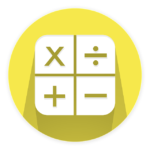
Mathematics
Third graders build off of their previous experiences and deepen their mathematical skills while applying the practices mathematicians use. They…
- Make sense of problems and persevere in solving them.
- Reason abstractly and quantitatively.
- Construct viable arguments and critique the reasoning of others.
- Model with mathematics.
- Use appropriate tools strategically.
- Attend to precision.
- Look for and make use of structure.
- Look for and express regularity in repeated reasoning.
Third-grade mathematicians are encouraged to be creative problem solvers and flexible thinkers. They work through challenging problems in small groups and on their own, developing independence and persistence. They develop their fluency skills by playing with numbers which allows them to think flexibly with methods and strategies to solve problems efficiently and accurately.
Highlights of Third-Grade Mathematics
Operations and Algebraic Thinking
- Represent and solve problems involving multiplication and division.
- Understand properties of multiplication and the relationship between multiplication and division.
- Multiply and divide within 100.
- Solve problems involving the four operations, and identify and explain patterns in arithmetic.
Number and Operations in Base 10
- Use place value understanding and properties of operations to perform multi-digit arithmetic.
Number and Operations-Fractions
- Develop an understanding of fractions as numbers.
Measurement and Data
- Solve problems involving measurement and estimation of intervals of time, liquid volumes, and masses of objects.
- Represent and interpret data.
- Geometric measurement: understand concepts of area and relate area to multiplication and to addition.
- Geometric measurement: recognize perimeter as an attribute of plane figures and distinguish between linear and area measures.
Geometry
- Reason with shapes and their attributes.
Visit the Michigan Mathematics Academic Standards for a complete view of the third-grade standards your child will be working toward in math.
 Ideas for Supporting Your Mathematician
Ideas for Supporting Your Mathematician
- Compare estimates to the exact answer (i.e., small shopping trip totals, time to complete a chore, etc.).
- Create and solve equal groups and equal shares number stories (i.e., 24 cookies shared by 4 friends, 7 bags with 3 apples in each bag).
- When serving food, discuss ways to cut the food to feed 2, 4, 6, or 8 people.
- Measure items to the nearest ½ inch.
- Tell time to the nearest minute.
- Family Letters: Visit this site for an overview of the mathematical learning at school.
- Explore Bedtime Math app.
- Visit the Standards for Mathematical Practice for Parents.
